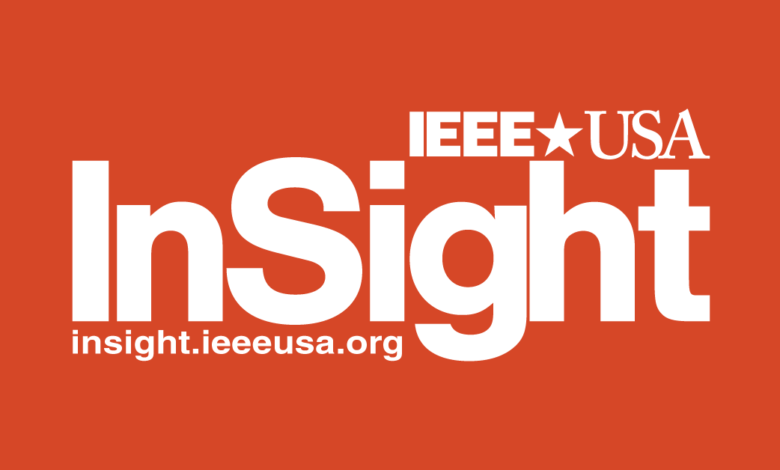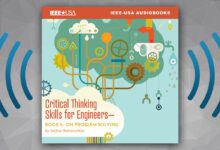
The work of the 111th Congress is basically done. Legislators have returned home to campaign for the upcoming election on 2 November. The current Congress will come back after the election for a lame-duck session, but that session will likely be short and focused primarily on budget issues. For most other issues, the 111th Congress is history. So, now is a great time to look back at what Congress accomplished this year.
IEEE members entered 2010 expecting action on several major issues and hoped Congress would tackle a few others. Overall, Congress’ performance was mixed, as it is most years. Some measures we supported passed, while others didn’t. But even in cases when bills we supported didn’t pass, progress was made that will help us in 2011.
The legislative process is about more than just votes. In many instances, sustainable progress was made this year raising the profile of technology issues with Congress, a necessary prerequisite for eventual passage.
More important, perhaps, than the success or failure of particular bills, was the attention Congress paid to technology issues in 2010. Energy issues, in particular, held Congress’ focus for much of the year, giving IEEE members ample opportunities to educate Congress. Even if Congress hasn’t yet taken action on these issues, legislators and their staffs have a better understanding of them after this year’s debates, which will help them make informed decisions in the future.
The following are some of the top issues IEEE-USA focused on in 2010. It is not an inclusive list, but rather highlights some of the more important issues we worked on this year.
2011 Budget
Usually, the federal budget — which includes spending for basic research, the national laboratories, K-12 math and science education, and other programs that support innovation and engineering — is supposed to be passed by the start of the new fiscal year, 1 Oct. However, Congress typically misses this deadline, especially in election years. And 2010 was no exception. Debate over the 2011 budget has been pushed off until after the election. You can see the status of appropriations legislation for 2011 by clicking on this link: appropriations process details.
Energy
IEEE-USA was very optimistic at the beginning of 2010 that Congress would pass significant energy reform legislation this year. It didn’t.
As 2010 began, there was broad bipartisan support for incentives to promote alternative energy production, improve the smart grid and promote energy efficiency. The House had already passed a comprehensive energy reform bill in June 2009, and Senate leaders supported passing a similar bill. After President Obama mentioned energy reform prominently in his State of the Union address in January, it looked like Congress would make it a priority.
But in the end, despite agreeing on the majority of provisions in the bill, Congress failed to reach a compromise on the most controversial issues. In particular, legislators could not reach agreement on environmental provisions related to global warming. Supporters of stronger environmental protections lacked the votes to pass their bill, but refused to support a smaller bill that omitted these provisions.
This type of occurrence is not uncommon. Congress frequently builds large bills around very popular ideas. In this case, the comprehensive energy reform bills were built around provisions promoting alternative energy and energy efficiency, and improving the electrical grid. Attached to these popular ideas were Cap and Trade, carbon sequestration, and other more controversial proposals. Bill sponsors hoped the popular provisions would entice enough senators to support the less popular provisions, but that did not happen. In the end, the environmental proposals proved to be too unpopular to pass, even with the energy provisions attached to them.
It is worth noting, however, that the failed energy reform bills provided IEEE members with ample opportunities to discuss energy issues with legislators. Members of Congress seldom think too deeply about how electricity is distributed around the country, or about large-scale electricity storage devices. But they did in 2010. This exposure should help legislators craft better energy legislation in 2011, when the issue will again be on their plates.
Energy Work Force
Beyond the comprehensive bills, IEEE-USA promoted two bills to accelerate the training of workers for the energy field. The first, the Community College Energy Training Act (H.R. 3731 & S. 1097), provided grants to community colleges to train students to work as technicians in the field. The second, the Re-Energyse Act, would have provided additional resources to colleges to create or expand power engineering programs.
Neither bill passed in 2010. The Community College Energy Training Act was introduced in both the House and Senate, and enjoyed solid support in both, but it became part of the comprehensive energy reform bill that failed. The Re-Energyse Act was never formally introduced. While these results are disappointing, both bills were new in the 111th Congress. It usually takes a few years for new legislation to pass, as legislators must be educated before winning their support. Progress was made on this front and both bills are positioned well for 2011.
America Competes Act
Originally passed in 2005, legislation reauthorizing the America Competes Act (H.R. 5116 & S. 3605) needed to be passed in 2010. The Act authorizes billions of dollars for programs of interest to engineers, including the national laboratories, basic research, university research and STEM education from kindergarten through post-graduate work.
Passed by the House in late June, the America Competes Act was never brought up for a vote in the Senate. A dispute over the bill’s cost has complicated what had been seen as an easy vote. The Act remains popular with legislators, and it may be brought up during the post-election lame-duck session.
Intellectual Property Reform
Versions of the Patent Reform Act have been debated in Congress for at least the last five years. This year’s bills (H.R. 1260 & S. 515) were introduced in early 2009. Legislators and advocacy groups (including IEEE-USA) fought over a host of issues in the bills, including converting the American patent system to a “first-to-file” system, consistent with Europe and Japan. After endless meetings, letters, briefings and press conferences, this Congress ended the same way the last two Congresses ended – stalemated. The bills failed to pass out of committee in either the House or the Senate. Most of the contentious issues remain unsolved, and Congress has made little progress towards solving them even after years of effort.
Engineering Education
Most of the engineering community in Washington enthusiastically supported the Engineering Education Act, or E2 Bill (H.R. 4709 & S. 3043). This bill will help states add engineering to their K-12 science curricula. It was a new bill, introduced in late February of this year, and a new idea. Despite being so new, the bill garnered widespread support in the House and Senate.
IEEE-USA had hoped the bill would pass in 2010, but knew that it is difficult to pass new legislation in one year. Now that it has learned more about the E2 Bill, Congress is far more likely to act on it in 2011, perhaps as part of the Elementary and Secondary Education Act (ESEA). This major education bill will reauthorize a number of popular education programs, and is on Congress’ agenda for early 2011.
Cybersecurity
The House of Representatives easily passed the Cybersecurity Enhancement Act (H.R. 4061) in February, by a vote of 422 to 5. This bill provides funds for new cybersecurity research, and helps the federal agencies involved with cybersecurity better coordinate their efforts.
The Senate debated two competing cybersecurity bills, neither of which ended up passing. The Rockefeller/Snow Cybersecurity Act of 2009 (S. 773), and the Lieberman/Collins/Carper Protecting Cyberspace as a National Asset Act of 2010 (S. 3480) are both broader than the House bill.
Despite failing to pass legislation, Congress signaled its growing awareness of cybersecurity by devoting considerable time to the issue in 2010. IEEE-USA is hopeful that more concrete steps will be taken in 2011.
Immigration
High-skill immigration reform never really made it onto Congress’ agenda in 2010. Despite an emerging consensus on how to reform the H-1B, L and EB visa programs, high-skill immigration remains a hostage to comprehensive immigration reform, which is far more controversial. (The dynamic is very similar to the one that stopped the energy reform bill.)
A small provision did pass in mid-August that impacts the H-1B and L temporary visa program. A bill to improve border security (H.R. 6080) was paid for, in part, by significantly increasing the fees some companies will have to pay for H-1B visas. Companies that employ more than 50 people, more than half of whom use H-1B or L visas, will now have to pay an additional $2,000 for each H-1B visa and $2,250 for each additional L visa. By taking this step, Congress has shown its willingness to reform both the H-1B and L visa programs. President Obama signed the bill into law on 12 Aug.
Lame-Duck Session
It is possible that some of these issues could be addressed in the lame-duck session of Congress that will begin in mid-November — but in most cases, that is unlikely. While congressional leaders haven’t decided how aggressive they want to be during the session, lame-duck sessions are not usually overly ambitious. It is likely that this year’s session will focus on the budget and, perhaps, one or two other small items. The America Competes Act could be among the handful of issues that get taken up, but beyond that, Congress has done all that it will do on most of our issues.
Russell T. Harrison is IEEE-USA’s Senior Legislative Representative for Grass Roots Affairs.






